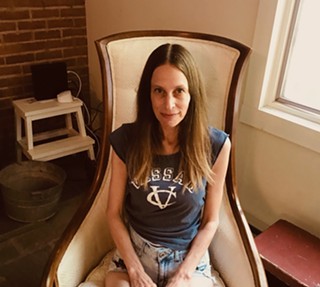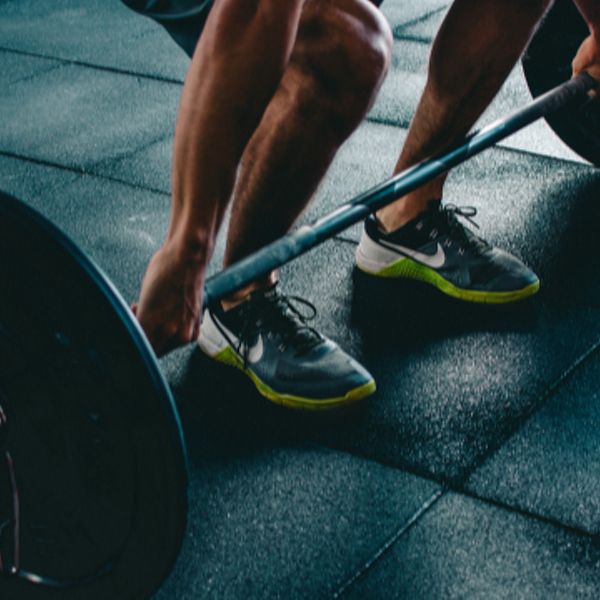Some people turn to cannabidiol, or CBD, for relief from anxiety or pain—but for Alison Jensen, experimenting with the cannabis extract was about the pursuit of pleasure. "After my last long-term relationship crashed and burned, I found myself deciding who I wanted to be as I aged," she says. "I was entering my mid-60s, and I knew that I wanted to bring more pleasure into my life." She tried online dating with varying degrees of disaster and success. When the computer algorithm matched her with a medical marijuana farmer from Long Island last year, she didn't find a soulmate but she did get a brief peek into the world of cannabis production. Around the same time, she happened upon a CBD-infused vaginal lubricant online that piqued her interest.
"All the female journalist reviewers said the same thing, which was varying degrees of 'wonderful' and 'the best sex ever,'" she says. But it was messy to apply, so with the farmer's help and some research, she learned how to make her own sex enhancer with CBD and coconut oil. Jensen (not her real name) shared it with female friends in her Hudson community, who quickly came back saying, "This is amazing, I want more—and by the way, I put some on my achy knee and it really helped."
As Jensen created a sensation among her peers with the lubricant, a similar explosion of interest was happening around CBD wellness products across the country. The CBD craze is still in full swing, fueled largely by anecdotal stories of its purported superpowers. You've likely heard from popular media that CBD is the answer to almost anything that ails you. The top four uses include anxiety, pain, insomnia, and seizures—but some turn to the extract for depression, PTSD, addiction recovery, and even cancer treatment support. Yet while researchers see a lot of promise in CBD for conditions like these, so far there's little scientific evidence that it can help with any of them—except seizures. Last year, the FDA approved a purified CBD extract called Epidiolex to treat rare seizure disorders after three clinical trials proved its safety and efficacy. More trials are on the way, as the push toward marijuana's legalization is gaining momentum and removing a lot of the stigma that hindered research in the past.
In the meantime, what's a CBD-curious consumer to do? We can proceed with caution—learning how to watch out for scam CBD, how to find products that uphold safety and integrity, and how CBD works in terms of dosing and individual effectiveness. "We need to temper our expectations," says Neal Smoller, PharmaD, owner of Village Apothecary in Woodstock and founder of WoodstockVitamins.com. "A lot of people believe they can go anywhere, buy any product, take a single dose, and their life will change." As a holistic pharmacist, Smoller considers it his mission to protect customers from faux quality and bogus claims. "If the supplement industry is the Wild West from a quality perspective, then CBD is Mad Max Beyond Thunderdome," he warns. "The quality standards that are supposed to be applied to supplements don't really apply to CBD because of their weird legal ambiguity. And nobody really follows supplement regulations anyway, so there are a lot of problems with that." With the CBD industry projected to reach $16 billion in the US by 2025, it's high time we get some clarity around the subject. (Without the marijuana high, naturally.)
Navigating CBD, from Oils to Gummies
There's a lot we don't know yet about CBD. But we do know that it's one of more than 100 cannabinoids, or closely related compounds found in the cannabis plant. Our bodies naturally produce cannabinoids, which interact with the endocannabinoid system—a collection of receptors found throughout the brain and body. Although this system is poorly understood, it's believed to help create homeostasis (balance) in the body and regulate sensitivities such as pain, inflammation, anxiety, sleep, and more.
CBD often plays second fiddle to its sexier sibling, tetrahydrocannabinol, or THC—the psychoactive cannabinoid in pot that makes you high. Even though it's chemically similar to THC, CBD will not get you stoked or give you the munchies—nor is it addictive. And while THC is a highly controlled substance, CBD is, for the most part, legal. The 2018 Farm Bill established that CBD is lawful in the US as long as it meets two requirements: It's derived from the hemp plant (rather than the more potent marijuana plant) and it contains less than 0.3 percent of THC. Yet some states and municipalities have tighter controls around the substance. And while CBD in foods was in vogue in New York a couple of years ago, it's verboten at the moment (goodbye, CBD-infused coffee, brownies, even cheeseburgers).
There's still a dizzying array of CBD varieties on store shelves—whether it's tinctures or oils, lotions, gel caps, vaping, or gummy bears. Gummies are cute, but it's hard for manufacturers to standardize how much CBD each one contains. Vaping carries risks, as we're seeing a series of vaping-related injuries and deaths in the news these days. "I like the liquid tincture because you can really dial in the dose," Smoller says. "Tinctures are also going to offer the lowest cost. As a yardstick, high-quality CBD should cost 10 cents or less per milligram. If you're spending more, you're getting ripped off." You can also apply CBD-infused lotions topically for pain—or, like Jensen, for pleasure. But beware of companies that add a tiny bit of CBD to pain-relief products like Biofreeze (camphor and menthol) just so they can overcharge for it.
Even if you stick to oral tinctures, the options don't end there. There's CBD isolate, which is almost 100 percent CBD and doesn't include the terpenes, waxes, and essential oils that naturally occur in the hemp plant. (Terpenes are the plant compounds that give weed its pungent aroma and taste.) Some say that CBD isolate lacks the therapeutic "entourage effect" that you get when all the plant compounds work in concert. That's why many prefer CBD distillate, or broad-spectrum CBD, which offers the full cocktail of compounds and no more than 0.3 percent of THC. Perhaps the most popular choice, full-spectrum CBD includes every compound except THC, making it safe for drug testing while still offering the entourage effect.
Shannon Flynn, a writer and teacher from Highland, has tried various forms of CBD from oils to gummies, with mixed results. After enduring both heart surgery and a car accident, she suffered from intercostal rib spasms for years. "I found that if I put topical CBD directly on those ribs, the spasms would stop," she says. "That was a miracle. I've also found that taking it orally helps me a lot with anxiety and sleep. One dropperful before bed, and I'm out." However, CBD did not have any effect on her severe pain from gout. "I had to take steroids and opiates for that," she adds. Meanwhile, she's noticed a lack of consistency in the quality of CBD products. Since she has a medical marijuana card, she can purchase prescription-grade cannabis products from a dispensary. Not surprisingly, she finds that over-the-counter CBD products often fail to provide the same level of integrity. "I'd rather know that a lab was hybridizing it for me and making it really perfect," she says. "You can buy CBD in the health food store, but do you really know how it was made?"
Finding Real-Deal CBD, and Weeding Out Imposters
If you know what to look for, you can indeed find quality CBD without a prescription. First, watch out for faux quality. "A lot of brands are providing a fake appearance of quality and transparency by posting a couple of their test results online," says Smoller. "But these tests are often incomplete or outdated, or they're not testing for the right thing." Since cannabis is a hyperaccumulator, it's a magnet for pesticides, herbicides, heavy metals, and other contaminants in the soil. Organic farming doesn't always ensure purity either, because hemp plants can grow mold or fungus on them. Good testing will certify that your CBD doesn't contain intruders like these.
A few local growers and producers are taking steps to uphold higher standards in CBD quality and testing—like High Falls Hemp. "We farm our own material, so we know where it's coming from," says Rick Weissman, a retired Wall Street executive who founded the small-scale, 13-acre operation in High Falls with his wife, Tricia. "That's one way we ensure quality and reliability. We also test everything on three levels. We test the plant material first; then we test the CBD distillate that we make from it. And after we make the distillate into our finished product, we test that as well." Seeing the test results for yourself is easy: Every vial of tincture or tube of lotion from High Falls Hemp has a QR code on the label that you can scan with your phone to view the lab reports for that product. Such transparency is rare in the CBD world.
In Columbia County, Hudson Hemp is a large-scale operation that prides itself on organic and sustainable practices. This summer, the women-owned business opened the farm for tours in a spirit of community-building. "People were able to walk through our operation, talk to the farmers, see what we're feeding our plants and what we're feeding our soil," says Melany Dobson, the company's VP of Brand Development. On the processing side, they use certified organic ethanol for the cold extraction process—"not because we need to, but because we care about the environmental impact," says Dobson. Hudson Hemp has a product line called Treaty, which is a collection of four CBD formulas enhanced with plant extracts. While you won't find published reports from their third-party lab testing, certificates of analysis and test results are available by request. Savvy consumers need not be shy about asking for them.
Just as important as quality and testing is getting the dosage right, and dosing can vary wildly from person to person. "Depending on how big you are and whether you have a mild or a severe issue, factors like these will affect what your starting dose should be," says Weismann from High Falls Hemp, whose website has information on dosing. "There's no one-size-fits-all." Weissman discovered this the hard way, as it took him about a year to find the correct dose to alleviate his chronic knee pain (he's now pain free). While one person might respond to as little as 10 milligrams of CBD oil, someone else might need 10 times that amount or more. A good rule of thumb is to start low and increase the dose over time until you get the desired effect. Side effects can include dry mouth, low blood pressure, and drowsiness. And CBD is not for everyone; Smoller estimates that for 10 to 15 percent of people, it won't work or it will require a dose that's too large to be affordable.
As for Alison Jensen, she's still going strong using CBD in the pursuit of pleasure and joy. While she considers her vaginal lubricant an essential bedside tool, she also finds a salve in CBD for her arthritic hips and knees. "When I see it's going to rain, and I know that's going to affect my mobility and pain level, I slather it on," she says. And like many dog owners, she claims that CBD helps to ease separation anxiety for her pooch. "It's saved my shoes, my remote, my sunglasses." That's happiness right there.


















